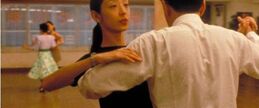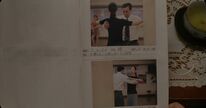This dance hall is special, at least in my opinion. Especially when there are not many students, it is more like a Chinese medicine store. People come and go, not for dancing, but they can actually get it. The dance hall was dark and dark, with no vitality, but full of ambiguousness. Such a scene was glimpsed by Sugiyama, who was exhausted at the end of the day, and it was more like guiding him to face his own shortcomings. In the hesitation, he still stepped into the dance hall. This place should attract more than the elegant and lonely teacher Kishikawa. Such a dance hall is more like a call to "can cure all diseases". The gorgeous Obasan, a middle-aged man with a "halo" on his head. Such a setting basically represents a variety of frustrated people. Each was disappointed, but he did not hesitate to vent his long-planned emotions in the dance hall.
Every time Sugiyama came home, the overwhelming sense of oppression came head on. Perhaps Sugiyama would be caught off guard at first, but after a while, he really couldn't resist. This kind of repression not only runs through the whole film, but also accurately reflects the true mentality of the Japanese people at that time. "Couples are not allowed to dance in public" This seemingly strange tacit understanding is exactly the resonance of our Orientals. All emotions should be internalized. All actions should be kept private. So every return home is more like a reincarnation point of depression. Home is the place everyone always goes back to every day. In fact, home and dance hall are not so conflicting, they are more like complementing each other. Talking about love and dancing are not necessarily related, but they can be perfectly integrated. Talking about love here is more like a heart-to-heart talk, a kind of emphasis on the soul, self-affirmation, and praise for life. God said that to have light, we must shine. Dance is indeed a good catalyst. Since it can help us regain some confidence and enrich some feelings, why not do it? So the next scene is that Kishikawa is no longer so indifferent, and Sugi is no longer so restrained. The other students also mingled, singing and dancing in harmony.
The rendezvous under the spotlight is the most beautiful stroke in the film. This beauty is both a scene and a situation. We like to pay attention to happy endings, no matter this dance or this relationship, we just care about what happens in the end. The director obviously saw through our psychology and dispelled the question of "whether Sugiyama and Kishikawa were together in the end" in the form of a retracement. Not sure not to deny. Let your imagination run wild.
After this dance, there is another one. After this relationship (if it can be called a relationship), it will return to the original life. Just maybe, Sugiyama won't let himself be dull anymore, and Kishikawa won't be lonely alone. Perhaps Sugiyama and the family are getting along better, and Kishikawa will welcome another Sugiyama. shall we dance? shall we talk? Maybe the point is not dance or talk. Is it more important to shall we? There have been some memorable moments poured into the lives of the two, so it seems that life is still very hopeful.
View more about Shall We Dance? reviews








